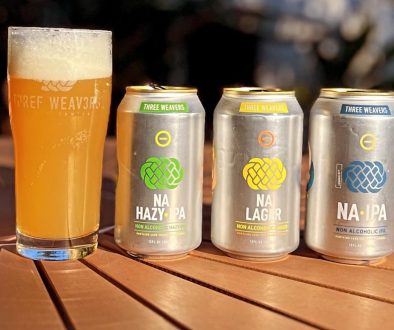It Quacks Like a Duck – Thoughts on CANarchy
There’s this thing in my backyard, and my neighbors keep telling me it’s a duck, but I’m not sure. Let’s see what you think.
It walks like a duck, but so did a girl I knew in high school.
It has feathers and a beak, but the latest research says that some dinosaurs did too.
It quacks like a duck, but there might be someone in the bushes with a duck call.
What’s the thing in my backyard? Why, it’s CANarchy. You know, the “disruptive collective of like-minded brewers dedicated to bringing quality and innovative flavors to beer drinkers in the name of independent craft beer,” six breweries that maintained their independence while securing capital and management expertise that will allow them to expand into new markets and generally save the day.
Or, if you belong to the “walk, look, quack; it’s a duck” school of thought, it’s six breweries – Oskar Blues, Perrin, Cigar City, Squatters/Wasatch, Deep Ellum, and Three Weavers – that got bought by a private equity firm based near Boston, Fireman Capital Partners, in deals that look one hell of a lot like the ones concluded between breweries like Goose Island, Golden Road, and 10 Barrel and a large source of “equity” called Anheuser-Busch InBev.

Isn’t the CANarchy deal almost exactly like the The High End, the bought-up craft breweries in AB InBev’s stable? The only difference, it appears to me, is that AB InBev is a brewery, and Fireman Capital Partners is a private equity firm. You know, the kind of firm that many people referred to as “vulture capitalists” during the 2012 presidential campaign, describing Mitt Romney’s firm, Bain Capital.
But that difference means that the CANarchy and Artisanal Brewing Ventures clients still get to slap the Brewery Association’s “Independent Craft Brewer” seal on their beers, because the BA’s definition of a “craft brewery” includes this as the definition of “independent”: “Less than 25 percent of the craft brewery is owned or controlled (or equivalent economic interest) by a beverage alcohol industry member that is not itself a craft brewer.” [emphasis added]
The guys at CANarchy are even more open about their goals than The High End. You can read it on their website: “CANarchy’s goal is to be the #1 provider of American craft beer in a can by bringing value to distributors, retailers & beer drinkers.” Given the way cans are taking over craft beer (best guess by the Brewers Association is that cans are 20-25% of craft production, and rising), that’s ambitiously monolithic. Makes me wonder if The High End are a bunch of slackers.
Before anyone’s knickers get in a twist, one way or another, let me say this: I drink beers brewed by both “The High End” breweries and the CANarchy breweries just as much as I did before they were bought. I respect the decision of some to avoid such beers because of the buy-outs, but I expect them to respect my decision to drink these beers because they still taste good.
I’d also expect them to be honest with themselves when it comes to these “collectives.” For the individual brewers going into these deals, it’s still hooking up with a big wad of money and management expertise with the goal of coming out on top of the specialty beer market…and no longer owning your brewery.
I’m not saying either of these types of deals are bad for craft brewing in general, if only because craft brewing still seems to be ticking along just fine. But they sure as hell don’t seem to be that different, either, so if one of them is bad… If one of them does walk, look, and quack like a duck, well, they both do.
I didn’t like it 30 years ago when people told me I had to drink Budweiser because it was America’s best-selling beer. I wanted to drink beer with more flavor, that tasted different. I don’t like it now when people tell me what I should and shouldn’t drink because of any reason other than how it tastes.
Lew Bryson has been thinking about beer and whiskey for over 20 years. Follow Lew: @LewBryson on Twitter and Instagram, Lew Bryson on Facebook. His book “Tasting Whiskey” makes a great gift, too!





August 27, 2019 @ 8:36 am
This is how it is different. If I sold to Inbev I wouldn’t be on the board of InBev. I am on the board of CANarchy.
If I sold to InBev I wouldn’t still be an owner, unless I bought InBev stock like anyone else can since it is a publicly traded company.
But you don’t get a voice in the room from buying open market stock. I am still an owner in CANarchy along with all the founders that came into it who all sit on the board of CANarchy with me. At board meetings about what CANarchy is or will be the board has to listen to my voice. At InBev they wouldn’t because I wouldn’t be an owner and board member. I don’t control CCB anymore, but I honestly I never felt like I was in control so no change there.
It isn’t the same from my point of view and I got to take a much closer look at both the duck and the not a duck. But it doesn’t matter really. I know it’s not quite the same and it is the reason I did what I did because the little differences mattered a lot to me.
September 13, 2018 @ 7:38 am
I have friends that work in the High End. I have friends that work for CANarchy. I will only comment that I will absolutely not buy beers from the High End, but it’s not for any romantic holier than though reasons. I don’t buy beer from the High End because much of the marketing $$$ that is spent by ABI is spent to reduce other breweries access to market. This is done through inducements, both legal and illegal, and through their distributors role as set captain. Inside of these distribution houses their role is that of an elephant in a china shop. They push and pull and try to use the weight of their flagship brands to ensure the shelf space of poorly performing beers in the High End over that of better performing independents. So while I don’t mean to pass judgement on anyone for such choices, I will ask a pointed question… What happens to some of your favorite independent breweries when over 50% of the shelf space for “craft” is taken up by non-independent brewers? The domino effect this could have on creativity within the space is hard to imagine at this point. I only hope we don’t get to find out.
September 13, 2018 @ 5:18 am
Good article Lew. I agree, “to each their own” when it comes to a personal decision on what beers you will and won’t drink. I fall into the extreme end of the spectrum and no longer favor beers that receive “equity” is ANY form. Why should I? There is so much great craft beer out there, that if you lose one brewery to this form of “big beer” there are always others, who remain independent (sans external capital) to drink. Bottom line, as long as opinions on how individuals drink is accepted, I have no problem if we sit down at a pub with beers from different ends of the spectrum. Cheers!